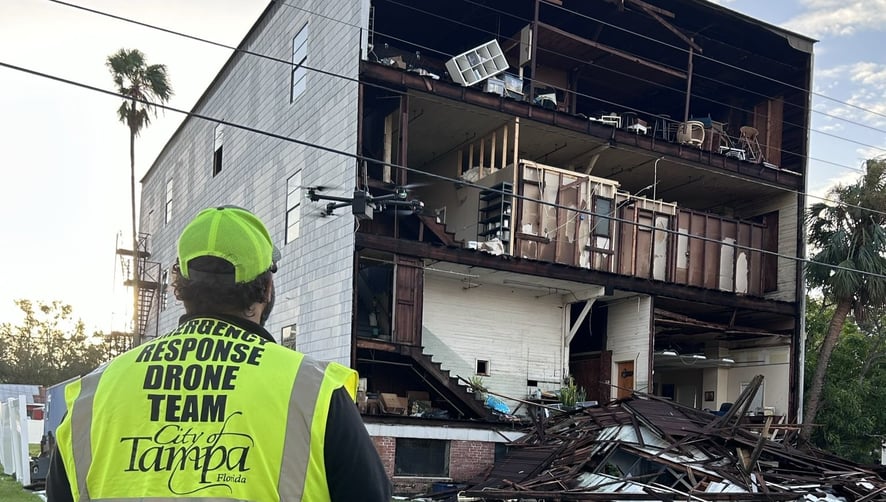Do I need a structural engineer for hurricane damage insurance claim?
3 min read


Here’s why you might need a structural engineer for a hurricane damage insurance claim:
1. Assessing Structural Damage
Why: Hurricanes can cause significant damage to a building’s structural elements, such as the roof, walls, foundation, and support beams. High winds can lift parts of the roof, collapse walls, and shift foundations, while heavy rains or flooding can lead to additional damage. If the hurricane has damaged the load-bearing components of your building, it is essential to determine the extent of the damage.
Action: A structural engineer will inspect the building to assess the damage to the structure, including:
Roof trusses and framing.
Load-bearing walls and columns.
Foundation shifts or cracks.
Structural connections that may have been weakened by wind or water.
2. Identifying Hidden Damage
Why: Hurricanes can cause damage that’s not immediately visible. For example, water intrusion can damage the framing, foundation, or internal structural components, and high winds can weaken supports in ways that may not be noticeable from the exterior.
Action: A structural engineer will have the expertise to detect hidden damage, such as:
Water damage to framing or floors.
Weakened supports that could lead to long-term issues.
Hidden foundation shifts or cracks that might not be obvious right away.
3. Ensuring Safety and Stability
Why: After a hurricane, the building may be unstable or unsafe to occupy. Structural damage to load-bearing elements, such as walls, beams, or columns, could pose serious safety risks. A structural engineer is necessary to evaluate whether the building can still support its loads.
Action: The engineer will determine whether the building remains structurally sound and if any temporary stabilization is necessary. They may recommend bracing or shoring up certain parts of the structure to prevent further damage or collapse.
4. Documenting Damage for Insurance Claim
Why: Insurance companies often require detailed documentation to process your claim and determine the compensation. A structural engineer’s report can provide a professional, objective assessment of the hurricane damage, which is often necessary for approval of your claim.
Action: The engineer will produce a written report that:
Details the scope and severity of the damage.
Includes photographs and diagrams of the affected areas.
Provides recommendations for repair or further evaluation.
Outlines the safety concerns related to the damage.
5. Recommendations for Repairs
Why: After assessing the damage, a structural engineer can suggest the best repair options. Some structural damage may require specialized repairs that go beyond simple cosmetic fixes, especially if the building’s load-bearing elements have been compromised.
Action: The engineer will recommend a plan to restore the structural integrity of the building, including:
Reinforcing or replacing beams, trusses, or walls.
Repairing foundation damage.
Upgrading storm-resistance features for future protection.
6. Ensuring Code Compliance for Repairs
Why: Any repairs made to the building after hurricane damage need to comply with local building codes, particularly those that pertain to storm resistance and wind load. A structural engineer will ensure the repairs are up to code.
Action: The engineer will ensure that the repairs meet local building codes and storm-resistance standards, ensuring the building will be more resilient to future storms.
7. Resolving Disputes with the Insurance Adjuster
Why: Sometimes, the insurance adjuster may not fully recognize the extent of the damage or might downplay the impact on the building’s structural integrity. In such cases, a structural engineer’s assessment can help substantiate your claim and ensure you receive a fair settlement.
Action: If there’s a dispute with the insurance company regarding the damage assessment or repair costs, a structural engineer’s professional report can provide independent evidence that the damage is significant and requires substantial repairs.
When to Call a Structural Engineer for Hurricane Damage:
Significant structural damage: If the hurricane has damaged roof supports, load-bearing walls, foundation, or support beams.
Hidden or less visible damage: If you suspect that water or wind damage has affected internal or less visible parts of the structure (e.g., framing, beams, foundation).
Safety concerns: If there are concerns about the building being structurally compromised, unstable, or unsafe to enter.
Disputes with the insurance company: If the insurance adjuster underestimates the severity of the damage or the cost of repairs.
Complex repairs required: If the damage is extensive and specialized knowledge is needed to recommend the correct repair methods.
Storm-prone areas: If your building is located in a region prone to hurricanes or other severe weather, a structural engineer can ensure your repairs meet necessary storm-resilience standards.
Contact Us
Get in touch with our team of professional engineers to discuss your project requirements or to request more information about our services.
(407) 901-0133
Contact Us
Address
Preeminent Solutions
P.O. Box 206, Sanford, FL, 32773
